|
Aurora Gallery back to spaceweather.com |
| Summary: Earth encountered a solar wind stream on March 9th, and that sparked auroras for several days. The best displays were at high latitudes: Alaska, Canada, Scandinavia and some norther-tier US states like Wisconsin and Minnesota. Two more solar wind streams caused geomagnetic storms on March 12-13 and 18-19. See also the February 2004 aurora gallery. Go
to Page 1 | This is Page 2 | Go
to Page 3 |
| Photographer, Location | Images | Comments | |
|
|
Wade
B Clark Jr, Lyman, Washington, USA Mar. 09 |
#1, more | This is my first digital photograph of an aurora. I took this picture to investigate if the weak glow hugging the northern horizon was light pollution or the northern lights. The color scheme of the glow makes me believe it was the aurora. Photo details: Canon Digital Rebel, ISO setting of 1600, 28mm lens at f3.5, 25 second exposure. |
|
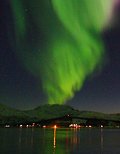
|
Hinrich
Bäsemann, near Tromso, Norway. Mar. 12 |
#1, more | After nearly two weeks with clouds we had a some nice auroras in northern Norway. Photo details: Canon 10 D, 17-35 mm, f 2,8, ISO 800, 6 sec |
|
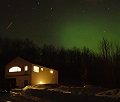
|
Jeff
Koch, Paynesville, Michigan, USA Mar. 10 |
#1, #2, #3, #4 | Aurora were dim to the eye due to a hazy sky. The camera could 'see' them better than I could. Sony DSC-717, 15 sec. exposures. 9:00 - 10:00 pm EST. |
|

|
Roman
Krochuk, near Fairbanks, AK Mar. 13 |
#1, #2, #3 | Very bright displays of aurora started somewhere around 10:30PM and continued at least till 1:30AM. Aurora occupied the whole sky and I was just looking around to see what would be the best to shoot. A great night of active and bright aurora. As always - Minolta Dimage7, ISO 400-800, f1/2.8, 3, 4 seconds or bulb exposures up to 10 seconds. |
|
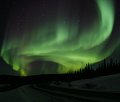
|
Peter
Jeffery, Madeline Lake, just outside Yellowknife, NWT, Canada. Mar. 18 |
#1, #2, #3, #4 | These photos were taken on a Canon 10D with a 17-35 f2.8 lens exposed for 15-30 seconds on 400 ASA. It was -37C with the wind chill tonight. Brrr...! |
|
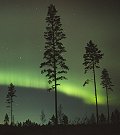
|
Tom
Eklund, Toijala, Finland Mar. 09 |
#1, #2, #3, #4, more | Fuji Provia
400F, 35mm and 28mm lenses at f/2.0 and f/2.8 and 8 sec. exposure times. |
|
|
James
Hamilton, Yellowknife, Northwest Territories, Canada Mar. 10 |
#1, #2, #3, #4 | Photo Details: Canon A60, f2.8, 10-13 seconds, ISO 200 setting |
|

|
Hans
Sivenius, Jämsä, Finland, Europe Mar. 09 |
#1, #2, #3, more | Photo details: Canon PowerShot A70, 100 ISO, 15s, F2.8 |
|

|
Krzysztof
Kordybach, Helsinki, Finland Mar. 09 |
#1, #2, #3 | First auroras appeared about 10PM (2000UT), but local fog successfully disabled any photographic activity. The pictures were taken two hours later, after midnight (2200UT), when the fog settled low at the frozen sea (it's still visible on the pictures). The auroras were strong for about 20 minutes, then they faded. Photo info: Fuji Superia 200, Canon EF lens 24/2.8, 10-20s exposures. |
|

|
Andre
Clay, Prudhoe Bay, Alaska Mar. 11 |
#1, #2, #3, #4, more | More incredible than last night, bright pink and purple streamers shooting through green arcs that covered the entire night sky. Canon 10D Sigma 15mm |
|
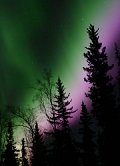
|
Jesper
Eriksen, Fairbanks, Alaska. Mar. 09 |
#1 | I stayed up at night, looking to catch some pictures of the aurora. And it whas worth it, this picture is taken with 'canon digital rebel' ISO 800 and 4s exposure. |

